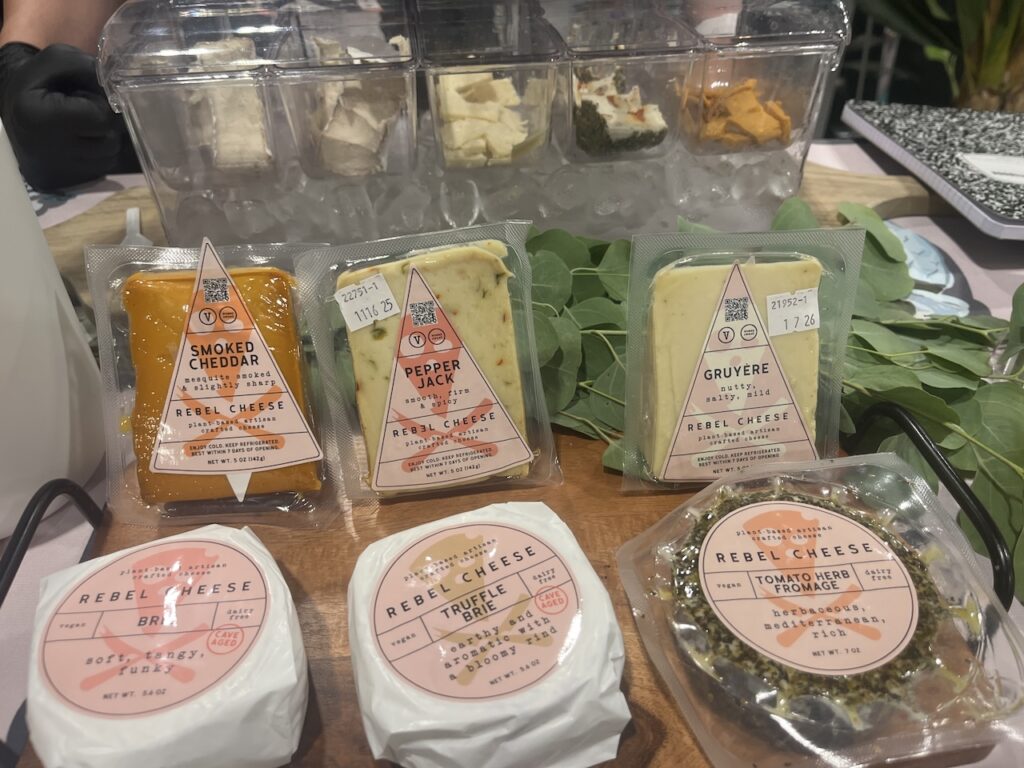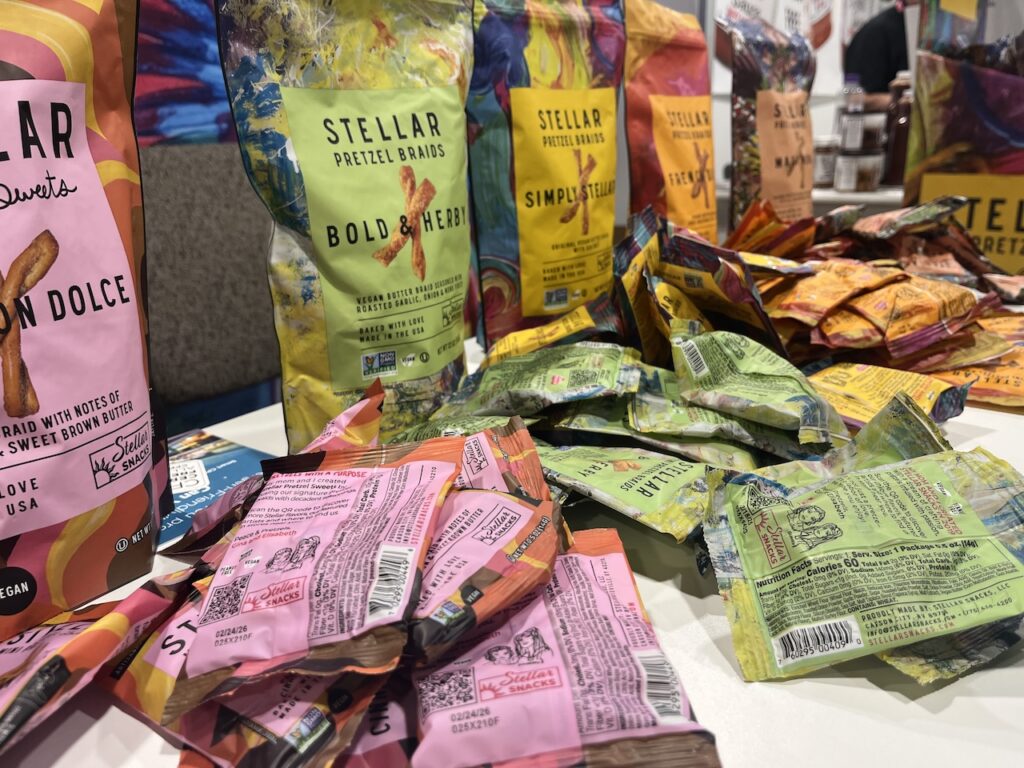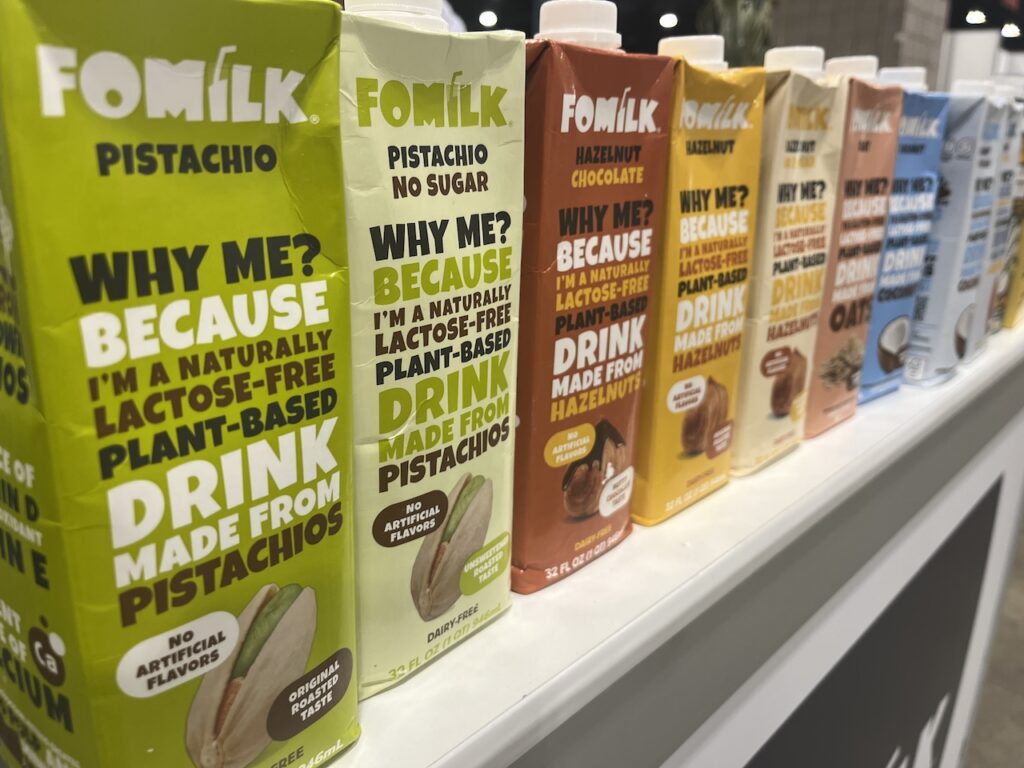
With nearly two decades of experience in marketing and brand-building, Nils Knoop has worked with global brands like Nike, Ben & Jerry’s, and Seventh Generation, specializing in impact storytelling and sustainability-driven campaigns. As co-founder of Apollonia and an advisor for HEYHO, he brings deep expertise in ethical branding and social impact.
In this guest feature for vegconomist, Nils shares key insights from Denver’s Newtopia Now. He explores how brands are leveraging scientific advancements, such as fermentation and next-gen proteins, to redefine the future of vegan products. Nils highlights the strategies and narratives that are shaping the industry’s evolution, offering a glimpse into the business models that will drive the next generation of plant-based leaders.
Denver’s Newtopia Now solidified its position not as a sprawling expo but as a curated convergence of emerging CPG brands, offering a refreshing, business-intensive environment for buyers, investors, and distributors. Unlike its larger sibling, Natural Products Expo West, the emphasis was on disruptive innovation, strategic positioning, and the direct connections essential for scaling the next generation of leaders.
The brands that commanded attention weren’t merely selling products; they were showcasing a business vision built on scientific innovation, targeted market strategies, and a deep understanding of the modern consumer’s priorities. For investors and industry leaders, the show provided a clear blueprint for where the vegan CPG market is heading: beyond imitation to true, purpose-driven disruption.
Alt-proteins redefined: Fermentation and the retail strategy
The most compelling narrative at Newtopia Now was the shift away from simple plant-based ingredients towards next-generation alternative proteins, with fermentation taking center stage. Brands are leveraging this technology to overcome the textural and nutritional limitations of early plant-based products, creating a competitive edge.
Nature’s Fynd is a prime example of a brand where biotechnology is the business strategy. Their platform is built on a single, powerful microbe, a fungi known as Fusarium strain flavolapis, originally discovered in a Yellowstone hot spring. The science behind their success is a proprietary “liquid-air interface fermentation” process. This method allows the microbe to grow rapidly on a thin, nutrient-rich film, forming a mycelial mat that is naturally high in protein. Their Fy™ protein is more than a novelty; it is a proprietary technology that allows them to scale production sustainably. Unlike pea or soy protein, which often require extensive processing to achieve functional textures, Fy™ protein’s filamentous structure provides a natural “meaty” or “creamy” texture straight from the source. The resulting protein is a complete one, containing all nine essential amino acids, which addresses a key nutritional challenge often associated with single-source plant proteins.

From a retail perspective, this technology enables them to create a versatile range of products, from breakfast patties to yogurt, all from a single, efficient ingredient source. This gives them a strategic advantage in merchandising and in telling a cohesive brand story about technology-driven food innovation. The vegan consumer is increasingly educated about protein sources, and Nature’s Fynd’s narrative of a high-efficiency, all-in-one protein source resonates with this segment.
In the realm of dairy alternatives, Rebel Cheese also leverages the science of fermentation, but with a different approach and a strategic focus on the artisanal, premium market. Their artisanal, cave-aged products are not simply nut butters with flavorings. They are cultured, living foods. The process involves fermenting a base of organic cashews with a proprietary blend of enzymes and cultures, many of which are strains used in traditional cheesemaking. This is an alchemical process that goes far beyond a simple food mixture. The fermentation breaks down the cashew proteins and fats, creating a complex array of organic acids, esters, and volatile compounds that are responsible for the tangy, funky, and nutty flavor profiles of aged dairy cheese.

Their business model is not about competing on cost but on quality. Their direct-to-consumer and specialized retail channels allow them to target a specific “vegan foodie” demographic willing to pay a premium for a gourmet experience. From a vegan perspective, Rebel Cheese demonstrates that the microbial complexity responsible for the deep flavors of dairy can be replicated using plant substrates, moving the category from “cheese-like” to a truly “cheesy” experience.
Retail playbook: Tapping into the functional and on-the-go market
Beyond fermentation, the show highlighted a new era of plant-based products driven by a sophisticated understanding of nutritional science. Brands are no longer just replacing animal products; they are formulating for specific health benefits. The snack and beverage categories at Newtopia Now demonstrated a clear understanding of modern consumer behavior, where convenience, functionality, and ethical sourcing are paramount.
Simply Protein is a great case study in brand evolution and retail strategy. Their new “Keep it Simplyfied” campaign moves beyond a product-focused message to connect with consumers on an emotional level. The brand’s products, which are high in protein and low in sugar, appeal to a wide demographic looking for healthy, no-fuss snacking. Their retail success is tied to a strategy of broad availability, with products found in major retailers like Target. From an alt-protein perspective, they have perfected the use of plant-based protein isolates to deliver high protein counts without compromising on a light, crispy texture.

Stellar Snacks brings an equally compelling retail story to the snack aisle. The company is a veteran in the pretzel manufacturing space, but their brand stands out because of its commitment to clean ingredients (vegan, non-GMO) and a focus on craftsmanship. Their success in the B2B space, particularly with airlines, has provided a strong foundation for their direct-to-consumer and retail play. Their commitment to high-quality, plant-based ingredients, such as vegan butter, demonstrates that they understand the modern consumer’s desire for “better-for-you” versions of classic comfort foods.
Birdman, a leading plant-based nutrition company from Mexico, exemplifies a strategic approach to market expansion. Their product lines, like Falcon Protein, are formulated with a blend of pea and rice proteins to create a complete amino acid profile. Birdman’s success is rooted in its understanding of both the DTC and retail markets, offering a range of products from protein powders to superfood blends.
The remaining snack and beverage brands showcased a similar understanding of consumer trends. Pecana, Fomilk, and PKN are tapping into the diversification of the plant-based milk market by utilizing unique and nutritionally compelling nut bases. They are making a strategic bet on a new nutritional narrative: the pecan.

Finally, brands like Lotus Pops, made from popped lotus seeds, offer a light, crunchy, and nutritionally dense alternative to traditional chips, tapping into ancient superfoods for modern snacking. Splitz presents gluten-free, organic split-pea crisps that are vegan and packed with plant-based protein and fiber, delivering a clean, flavorful crunch that outperforms standard chips. Darious Snacks highlights the versatility of dates, transforming a natural sweetener into a convenient and energy-rich on-the-go option. Cactus Foods brings a truly novel ingredient to the fore, leveraging the resilience and nutritional benefits of nopal cactus in their offerings. Colorado local Send Bars, with its focus on adaptogens and targeted benefits for athletes and active lifestyles, demonstrates a sophisticated understanding of a niche market seeking performance-enhancing plant-based options.
Conclusion: A strategic and scientific future
The Newtopia Now trade show made it clear that the future of the plant-based industry is inextricably linked to scientific innovation and strategic business development. The brands that are poised for success are those that have moved beyond simple ingredient swaps to harness technologies like microbial fermentation, to explore nutritionally superior alt-protein bases, and to design products with functionality at their core.
The conversation has evolved from whether a product can be made vegan to how it can be made vegan in a way that is scientifically superior, nutritionally compelling, and strategically positioned for long-term growth. The pioneers at Newtopia Now weren’t just selling food; they were selling the future of food,one powered by science and a profound understanding of the vegan and alternative protein ecosystem.





































































